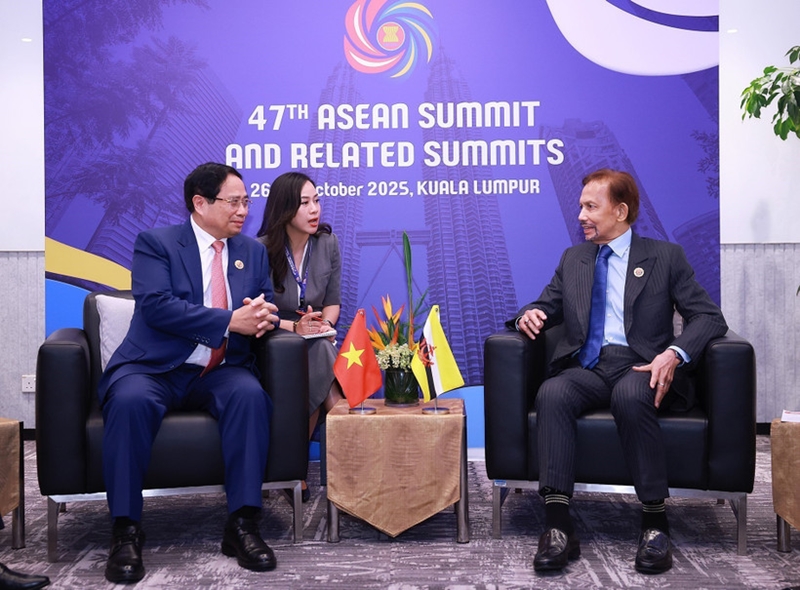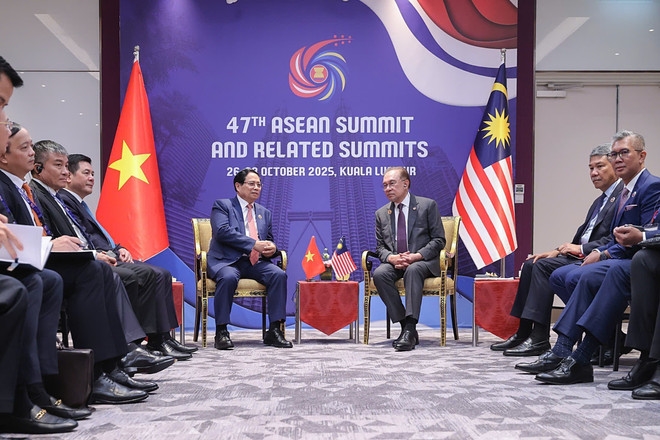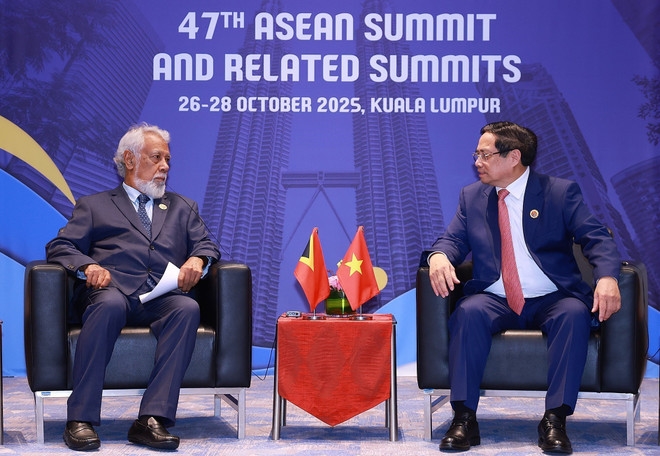At the meeting with the Sultan of Brunei, PM Pham Minh Chinh affirmed that relevant Vietnamese ministries and agencies will actively coordinate with Brunei to thoroughly prepare for the upcoming visit to Vietnam by the Sultan and the Queen, ensuring it yields positive and substantive results.
    |
 |
|
Prime Minister Pham Minh Chinh (left) meets with Brunei’s Sultan Haji Hassanal Bolkiah in Kuala Lumpur on October 28. |
Sultan Hassanal Bolkiah expressed his delight at the continued positive development of bilateral relations. Highlighting the potential for further cooperation, he noted that the two countries still have ample room and opportunities to strengthen collaboration in areas such as oil and gas, fisheries, tourism, and particularly in joint ventures for Halal food processing in Vietnam.
Regarding the orientation of bilateral cooperation, PM Pham Minh Chinh emphasized the highly complementary nature of the two economies, while proposing Brunei continue to facilitate Vietnamese enterprises in conducting mutually beneficial business cooperation across all sectors; grant additional licenses for Vietnamese fishing vessels and fishermen to operate in its waters; and support Vietnam in certifying and producing Halal food, and making the most of Vietnam’s abundant and diverse raw material advantages.
On this occasion, the two leaders agreed to continue effectively implementing the Action Program for the implementation of the Vietnam - Brunei Comprehensive Partnership for the 2023-2027 period; enhance exchanges and contacts at all levels; and promote people-to-people interactions, thereby creating momentum for and deepening the bilateral relations in the time ahead.
At the meeting with the Malaysian PM, the two leaders highly valued the efforts of both countries’ ministries and sectors in promptly implementing cooperation areas, thereby helping to advance the Vietnam - Malaysia Strategic Partnership in a deeper and more substantive manner. They affirmed that economic cooperation remains a key pillar in the bilateral relations in the coming period.
    |
 |
|
Prime Minister Pham Minh Chinh and Malaysian Prime Minister Anwar Ibrahim at their meeting in Kuala Lumpur on October 28 |
Expressing his pleasure at meeting PM Anwar again following his official visit to Malaysia on the occasion of the 46th ASEAN Summit in May, PM Chinh commended the significant progress in bilateral economic ties, noting that two-way trade reached over 12 billion USD in the first nine months of 2025, a year-on-year increase of 12.9%.
PM Anwar welcomed PM Pham Minh Chinh’s proposal for both sides to soon sign a cooperation document in the field of Halal industry development, and affirmed that Malaysia stands ready to support Vietnam in organizing promotional activities for agricultural products to enhance their presence in the Malaysian market.
PM Pham Minh Chinh also proposed the two countries continue working together to strengthen defense relations based on the effective implementation of the Memorandum of Understanding on Bilateral Defense Cooperation signed in December 2023.
He expressed his hope that the two sides will soon sign cooperation agreements in the fields of security, education, and aviation; and further expand collaboration in the fields of digital economy, green economy, science and technology, innovation, smart agriculture, e-government, cybersecurity, and AI human resources training.
The Malaysian leader agreed that the two countries should establish a consultation and management mechanism on maritime issues, coordinate with other ASEAN countries to implement practical cooperation on marine and ocean affairs, and strengthen fisheries cooperation. He welcomed Vietnam’s efforts in combating illegal, unreported, and unregulated (IUU) fishing and agreed to work closely with the country towards the removal of the E.C.’s “yellow card” warning.
At his meeting with his Timor-Leste counterpart Gusmão, PM Pham Minh Chinh congratulated Timor-Leste on officially becoming the 11th member of ASEAN, a historic milestone in the country’s integration process and in ASEAN’s development journey.
He affirmed that Vietnam will continue to accompany and is ready to support and share its experience to help Timor-Leste effectively participate in and make active contributions to the ASEAN Community.
    |
 |
|
Prime Minister Pham Minh Chinh meets with Timor-Leste Prime Minister Xanana Gusmão in Kuala Lumpur on October 28. |
The two PMs noted that the bilateral friendship and collaboration have continued to develop positively in recent years, particularly in the fields of economy and trade, agriculture, telecommunications, and education.
They agreed to enhance delegation exchanges at all levels, effectively implement existing cooperation agreements, and expand collaboration in potential areas such as green economy, digital economy, clean energy, innovation, and AI.
The two leaders agreed to further deepen the bilateral relations in the coming time, promote high-level and all-level visits, and soon convene the first meeting of the Vietnam - Timor-Leste Joint Committee at the foreign minister level. They also vowed to effectively implement the signed agreements, tap into the potential for economic cooperation, particularly in trade and investment, and create favorable conditions for businesses from both countries to operate and invest in each other’s markets. Both sides concurred on enhancing cooperation in culture, tourism, and education, making positive contributions to people-to-people exchanges and fostering the friendship and multifaceted cooperation between the two nations.
Discussing regional and international issues, the two sides agreed to maintain close coordination and mutual support at multilateral forums. PM Pham Minh Chinh expressed his hope that Timor-Leste, as a state party to the United Nations Convention on the Law of the Sea (UNCLOS) 1982 and the 11th member of ASEAN, will continue to support ASEAN’s common position on the East Sea (aka South China Sea) issue and work together towards achieving an effective and substantive Code of Conduct (COC) in accordance with international law, especially the UNCLOS 1982, thus contributing to making the East Sea a sea of peace, stability, cooperation, and development.
Source: VNA